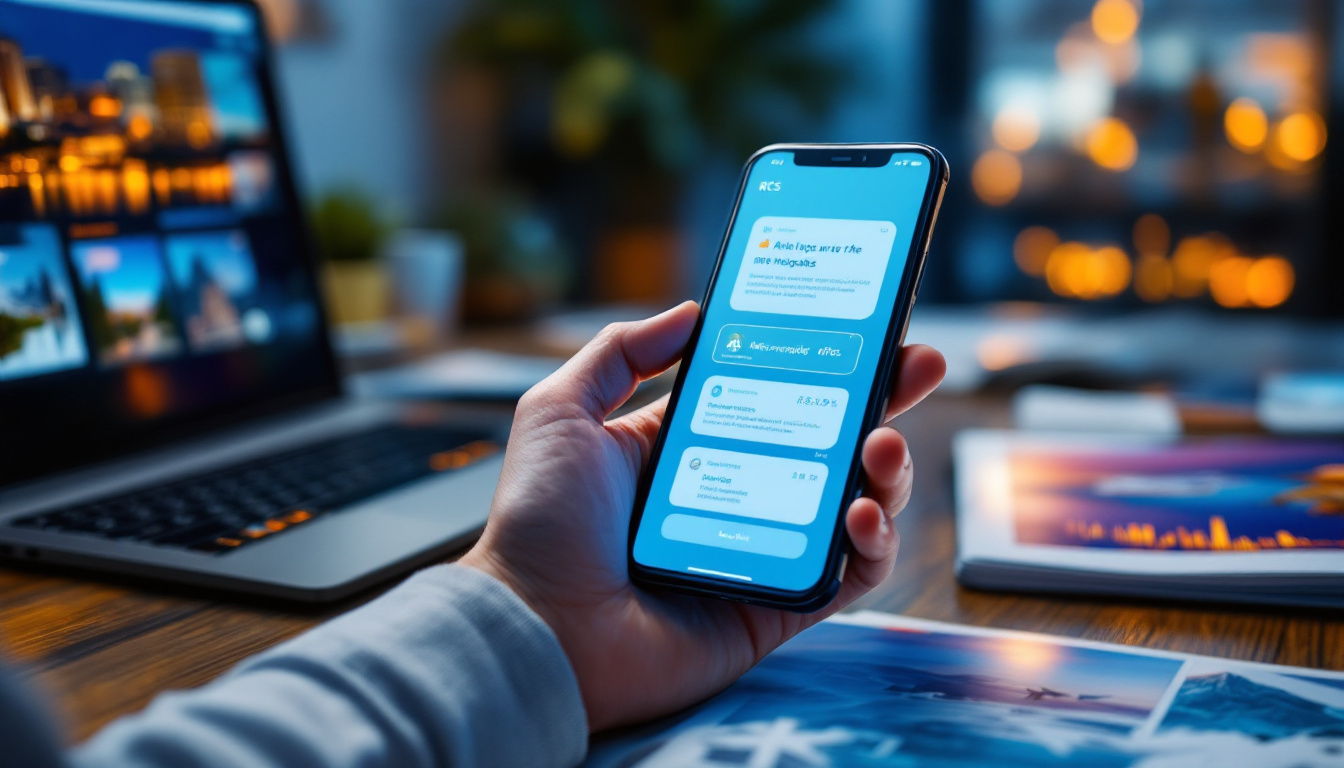In an increasingly digital world, the travel and hospitality industries are continually evolving to meet customer expectations. One of the latest innovations reshaping customer communication is Rich Communication Services (RCS) business messaging. This technology not only enhances booking confirmations but also streamlines ongoing updates, contributing significantly to a seamless travel experience. In this article, we will explore how RCS is redefining customer engagement in these sectors.
Understanding RCS Business Messaging
RCS business messaging is a protocol designed to enhance traditional SMS messaging. It provides advanced features such as rich media, interactivity, and analytics, allowing businesses to engage with customers in a more meaningful way. Unlike standard SMS, RCS can incorporate images, carousels of products, quick reply buttons, and even location sharing, which creates an enhanced experience for users.
For the travel and hospitality sector, RCS offers the perfect platform for communicating vital information about bookings, updates, and offers. It allows brands to not only confirm bookings but also to enrich those interactions with additional content that informs and engages customers.
Defining RCS Business Messaging
RCS stands for Rich Communication Services. It is a protocol that operates over the internet instead of traditional telephony networks. This shift allows business messages to be richer and more interactive. With RCS, companies can share high-quality images, video content, and even provide payment functionalities directly within the messaging app.
This technology supports one-on-one interactions as well as group messaging, enabling businesses to reach multiple customers at once while maintaining a personalized touch. The interactive features allow brands to create tailored experiences based on customer preferences, significantly increasing engagement rates.
The Role of RCS in Travel and Hospitality
The travel and hospitality industries are particularly well-suited for adopting RCS business messaging. From booking confirmations and flight updates to promotional offers and customer support, RCS enhances communication at every stage of the customer journey.
For instance, airlines can send flight reminders, gate changes, and boarding updates directly to customers through RCS. Hotels can confirm reservations, share check-in instructions, and even offer personalized recommendations for local attractions—all in a visually rich format that captures customer attention.
Moreover, RCS can facilitate seamless interactions between customers and service providers. Imagine a traveler receiving a message from their hotel that not only confirms their stay but also includes a virtual tour of the hotel amenities, a link to book spa services, or even a prompt to order room service—all through a single, interactive message. This level of engagement not only enhances the customer experience but also drives additional revenue opportunities for businesses.
Additionally, RCS messaging can be used for post-stay follow-ups, where hotels can solicit feedback through interactive surveys or offer loyalty rewards for future bookings. This ongoing communication helps to foster a sense of connection and loyalty between the brand and the customer, encouraging repeat business and positive word-of-mouth referrals. The possibilities are vast, making RCS an invaluable tool for businesses looking to thrive in the competitive travel and hospitality landscape.
The Impact of RCS on Booking Confirmations
Booking confirmations are a crucial touchpoint in the customer experience. Traditionally, these have been sent via email or SMS, which can lack personalization and engagement. With RCS business messaging, these confirmations become an opportunity for brands to enhance customer experience significantly.
RCS allows companies to incorporate branding, images, and interactive elements which not only convey essential information but also create a memorable interaction. This approach not only informs customers but also reinforces brand identity at a key moment in the travel process.
How RCS Enhances Booking Confirmations
When a customer books a flight or hotel, they expect immediate confirmation. RCS elevates this experience by delivering visually appealing confirmations that can include embedded maps, check-in options, and loyalty program details. This level of detail provides customers with all the information they need at a glance, streamlining their experience.
Moreover, these confirmations can be interactive. Customers can directly access flight status, manage bookings, and download itineraries without having to navigate through multiple platforms. This convenience can significantly improve customer satisfaction and loyalty. Additionally, the integration of real-time updates means that if there are any changes to their itinerary, customers can receive instant notifications through RCS, ensuring they are always informed and prepared.
The Benefits of RCS for Booking Confirmations
- Enhanced Engagement: The rich media capabilities of RCS engage customers more effectively than text messages.
- Personalization: Businesses can tailor messages based on customer preferences, creating a unique experience for each traveler.
- Immediate Access to Information: Customers can access critical details instantly, reducing frustration and confusion.
- Brand Visibility: The visually rich format reinforces brand identity and promotes brand loyalty.
Furthermore, RCS opens the door to additional features that can elevate the booking confirmation experience even further. For instance, brands can include links to local attractions, dining options, or weather forecasts for the destination, allowing customers to plan their trip more effectively. This not only adds value to the confirmation but also positions the brand as a helpful resource throughout the travel journey.
Another significant advantage of RCS is its ability to facilitate two-way communication. Customers can respond to confirmations with questions or requests, enabling a dialogue that can enhance their travel experience. This interactive capability fosters a sense of connection between the customer and the brand, making them feel valued and heard, which is essential in today’s competitive market.
The Influence of RCS on Updates
Updates are essential in the travel industry, especially since plans can change frequently. RCS allows for timely and relevant communication about flight changes, hotel policies, and other important notifications. The ability to send updates via a rich messaging platform helps keep travelers informed and prepared. This is particularly crucial during peak travel seasons when delays and cancellations can occur more frequently, leaving travelers anxious and in need of immediate information. By utilizing RCS, companies can alleviate some of that stress by providing real-time updates that are easily accessible.
With RCS, businesses can also provide updates that anticipate customer needs. For example, offering alerts about weather changes or local events can enhance the travel experience and foster loyalty. Imagine a traveler receiving a notification about an unexpected rainstorm in their destination city, along with suggestions for nearby indoor attractions or restaurants. This level of personalized service not only improves the traveler’s experience but also builds a stronger relationship between the customer and the brand.
The Advantages of RCS for Updates
Integrating RCS for updates provides several advantages. First, the immediacy of messaging ensures that travelers receive information as it becomes available. Second, the interactivity of RCS messages allows customers to respond or take action directly through the messaging app, making communications not just informative but also actionable. For instance, a traveler could confirm a new flight time with a simple tap, eliminating the need for additional phone calls or website visits. This seamless interaction enhances user satisfaction and streamlines the communication process.
Furthermore, RCS messages can track customer engagement and responses. This data can be analyzed to optimize future communications, leading to even better customer experiences. By understanding which messages resonate most with customers, businesses can refine their strategies, ensuring that updates are not only timely but also relevant and engaging. This level of insight can lead to innovative approaches in customer service, such as proactive outreach for rebooking options or personalized travel tips based on previous interactions.
The Process of Sending Updates via RCS
Sending updates through RCS is a straightforward process. Businesses create a campaign that outlines the type and content of updates they wish to share. This content can include real-time updates, promotional messages, or reminders. The flexibility of RCS allows for multimedia elements, such as images or videos, to be included in these messages, making them more visually appealing and informative. For example, a hotel could send a message featuring a stunning image of their pool area, enticing guests to take advantage of a limited-time offer.
Once crafted, the messages are sent to targeted customer segments using the RCS protocol. The messages can be tailored based on various demographics, preferences, and behaviors, ensuring that the right message reaches the right customer at the right time. This targeted approach not only increases the likelihood of engagement but also enhances the overall effectiveness of marketing strategies. By leveraging customer data, businesses can create a more personalized experience, fostering a sense of connection and understanding that resonates deeply with travelers.
The Future of RCS in Travel and Hospitality
The future of RCS in travel and hospitality looks bright, given its potential to transform customer communications. As more businesses adopt this technology, we can expect to see innovative applications that further enhance customer engagement and satisfaction.
From improved operational efficiency to better customer experiences, RCS is poised to play a pivotal role in shaping the future of how the travel industry communicates with its customers.
Predicted Trends for RCS in the Industry
- Increased Adoption: As more brands recognize the value of RCS, adoption rates are expected to soar, becoming a standard communication tool in the industry.
- Integration with AI: We may see RCS integrating with artificial intelligence for personalized experiences, predictive messaging, and enhanced customer support.
- Focus on Sustainability: There may be a shift towards eco-friendly messaging practices, with brands using RCS to promote sustainable travel options.
- Enhanced Security Features: As customer data becomes increasingly important, RCS is likely to incorporate more robust security measures to protect sensitive information.
Preparing for the Future of RCS Messaging
Businesses must prepare for the future by investing in RCS technology and training staff to utilize its capabilities effectively. Understanding customer preferences and developing personalized messaging strategies will be crucial for success. Moreover, gathering feedback and analyzing data will help refine future interactions and improve overall service quality.
In addition to training and technology investment, companies should also focus on creating a seamless omnichannel experience. This means ensuring that RCS messaging integrates smoothly with other communication platforms, such as email and social media. By doing so, businesses can provide a cohesive experience that meets customers where they are, allowing for more effective engagement. Furthermore, as travelers increasingly seek out experiences rather than just destinations, RCS can facilitate richer storytelling through multimedia content, such as videos and interactive maps, that showcase unique offerings and local attractions.
The potential for RCS to enhance loyalty programs is another exciting avenue for the travel and hospitality industry. By leveraging RCS, companies can send personalized offers and updates directly to customers, making them feel valued and recognized. This direct line of communication can foster stronger relationships, encouraging repeat business and enhancing customer loyalty. As the industry evolves, the ability to provide tailored experiences through RCS will not only set brands apart but also redefine customer expectations in the travel landscape.
Ready to Elevate Your Customer Engagement?
Embrace the future of business messaging with nativeMsg, The RCS Business Messaging Creator. Transform your customer interactions from simple texts to immersive, interactive experiences. Whether you’re in travel, hospitality, or any other industry, nativeMsg enables you to create, send, and optimize RCS messages that captivate your audience. With our drag-and-drop interface, analytics, and broad reach across devices, you’ll see engagement and conversions soar. Don’t just communicate; connect and impress with nativeMsg. Get Started today and revolutionize the way you interact with your customers.
Free Trial
Get Started With RCS
Business Messaging!
Unlock the power of RCS and revolutionize your customer engagement.





